the ROME – More than 288.000 people infected and more than 5,700 deaths, 73% of children under 5 years of age. Are the numbers of the epidemic of measles going on in the Democratic Republic of the Congo (DRC), from January 2019. According to the WHO, this is the largest outbreak of measles in the world today and the most severe ever recorded in the DRC for decades. In spite of the efforts made at the national level, you need to commit and allocate a matter of urgency, more resources to the areas still affected and to stop the epidemic. Measles is a highly contagious viral disease transmitted in the air, which predominantly affects children between 1 and 3 years, and is one of the main causes of child mortality in developing countries. At the time of the CDR, a patient with measles infects on average two or three others. There is no specific treatment against the disease, but a vaccination campaign, if well conducted, it is extremely effective to prevent new cases. In areas where the vaccination coverage is insufficient, the activity of vaccination can reduce child mortality by 50%. The emergency is affrontat by the staff of Doctors Without Borders working in the DRC since 1977.
The causes of the spread. Several factors are contributing to the spread of the epidemic in the DRC. First of all, a vaccination coverage extremely low in some regions of the country, due to a lack of vaccines and the personnel to administer them, or access to health facilities. There are also the difficulties in maintaining vaccine at the correct temperature until the injection, which reduces its effectiveness, and the logistical difficulties in bringing vaccines to their final destinations. The needs are enormous and the national program of vaccination can not keep up. In the span of a year, the epidemic has spread in all the 26 provinces of the Country and shows no signs of attenuation: 9.605 new cases have been reported in the last week of November, the highest number since the beginning of the year. The rate of mortality, as well as the 2%, is double compared to previous years, and 73% of the deaths are children under the age of 5 years.
The cases are under-reported and the "sites " sentry" of the MSF. in Addition to these, cases of measles remain underestimated throughout the country. MSF has enabled strategies of epidemiological surveillance to identify new areas affected by the epidemic, to start new projects as quickly as possible. As in Viadana, in the province of Bas-Uélé, where a small team of MSF has been assessing the situation after a rapid rise in cases, seen at the beginning of December. What they found went far beyond the received data. In a school of about 300 children, over 100 were suffering from measles. This intervention has enabled MSF to immediately start the medical activities for these children and to organize a vaccination campaign. A similar system was established in the 4 provinces of the ex-Katanga, in the South-East of the Country, where MSF has created the “sites " sentry” and released in October 2019 a laboratory decentralized to quickly analyze suspected cases of measles and rubella. Before the samples were sent to Kinshasa, and this could take several months.
A center for the treatment of complex cases. “When it is declared to be an epidemic, you have to combine medical assistance and vaccination to stop the spread of the disease," says Alex Wade, head of mission of MSF in the DRC - "by mid-November, the health authorities in the congo have started supplementary immunization activities against measles in the whole Country. In the meantime, MSF continues to provide medical care to the patients, but at the moment, the epidemic still remains stronger than the answer medical-humanitarian implementation". MSF also intervenes in the province of Kongo Central, where, to support the local health authorities, has opened on the 13th of December, a centre of treatment for complex cases of measles in the general hospital in Matadi, the provincial capital and main port of the country. A week before, another team had opened a similar facility in the coastal town of Muanda, a few hours drive to the west from Matadi. A few days after the opening, these centres were already full of patients, and the team of MSF you are supposed to move in larger structures.
The diseases linked to malnutrition. In these treatment centers, the team of MSF pay particular attention also to other diseases associated with measles, such as malaria and malnutrition, which greatly increases the risk of mortality. In addition, MSF supports the management of simple cases, distributing treatment kit, strengthening the epidemiological surveillance and the detection of new cases, and offering free transportation for patients that need to be transferred in other structures of care. From 2018, the team of MSF work to provide adequate care to patients suffering from measles, and to perform vaccinations in the different provinces of the country, including Ituri, Haut and Bas-Uélé, Tshopo, Kasai, Mai-Ndombe, Kwilu and South Ubangi. Between January 2018 and October 2019, with the teams of MSF have cared 46.870 patients and vaccinated 1.461.550 children in 54 health districts.
A vaccination plan. In collaboration with the local Ministry of Health, MSF has also helped to strengthen the activities of measles vaccination in the areas where it continues to spread the epidemic of Ebola and, therefore, the vaccination coverage for other diseases is drastically decreased. Unfortunately, many regions were not yet covered by vaccination campaigns. “The congolese Ministry of Health has initiated activities supplementary immunization, but there are still many areas in which the epidemic continues. We will have to wait until the end of these vaccinations in order to have a better picture of the evolution of the epidemic. But the current situation suggests that the needs will persist, especially for children over the age of five years who have not been vaccinated during this period. It will be therefore essential that humanitarian organizations and other actors in pooling all possible efforts to help the local health authorities to overcome this epidemic. Too many children have died from this disease, easily preventable,” concludes Wade of the MSF.
The causes of the spread. Several factors are contributing to the spread of the epidemic in the DRC. First of all, a vaccination coverage extremely low in some regions of the country, due to a lack of vaccines and the personnel to administer them, or access to health facilities. There are also the difficulties in maintaining vaccine at the correct temperature until the injection, which reduces its effectiveness, and the logistical difficulties in bringing vaccines to their final destinations. The needs are enormous and the national program of vaccination can not keep up. In the span of a year, the epidemic has spread in all the 26 provinces of the Country and shows no signs of attenuation: 9.605 new cases have been reported in the last week of November, the highest number since the beginning of the year. The rate of mortality, as well as the 2%, is double compared to previous years, and 73% of the deaths are children under the age of 5 years.
The cases are under-reported and the "sites " sentry" of the MSF. in Addition to these, cases of measles remain underestimated throughout the country. MSF has enabled strategies of epidemiological surveillance to identify new areas affected by the epidemic, to start new projects as quickly as possible. As in Viadana, in the province of Bas-Uélé, where a small team of MSF has been assessing the situation after a rapid rise in cases, seen at the beginning of December. What they found went far beyond the received data. In a school of about 300 children, over 100 were suffering from measles. This intervention has enabled MSF to immediately start the medical activities for these children and to organize a vaccination campaign. A similar system was established in the 4 provinces of the ex-Katanga, in the South-East of the Country, where MSF has created the “sites " sentry” and released in October 2019 a laboratory decentralized to quickly analyze suspected cases of measles and rubella. Before the samples were sent to Kinshasa, and this could take several months.
A center for the treatment of complex cases. “When it is declared to be an epidemic, you have to combine medical assistance and vaccination to stop the spread of the disease," says Alex Wade, head of mission of MSF in the DRC - "by mid-November, the health authorities in the congo have started supplementary immunization activities against measles in the whole Country. In the meantime, MSF continues to provide medical care to the patients, but at the moment, the epidemic still remains stronger than the answer medical-humanitarian implementation". MSF also intervenes in the province of Kongo Central, where, to support the local health authorities, has opened on the 13th of December, a centre of treatment for complex cases of measles in the general hospital in Matadi, the provincial capital and main port of the country. A week before, another team had opened a similar facility in the coastal town of Muanda, a few hours drive to the west from Matadi. A few days after the opening, these centres were already full of patients, and the team of MSF you are supposed to move in larger structures.
The diseases linked to malnutrition. In these treatment centers, the team of MSF pay particular attention also to other diseases associated with measles, such as malaria and malnutrition, which greatly increases the risk of mortality. In addition, MSF supports the management of simple cases, distributing treatment kit, strengthening the epidemiological surveillance and the detection of new cases, and offering free transportation for patients that need to be transferred in other structures of care. From 2018, the team of MSF work to provide adequate care to patients suffering from measles, and to perform vaccinations in the different provinces of the country, including Ituri, Haut and Bas-Uélé, Tshopo, Kasai, Mai-Ndombe, Kwilu and South Ubangi. Between January 2018 and October 2019, with the teams of MSF have cared 46.870 patients and vaccinated 1.461.550 children in 54 health districts.
A vaccination plan. In collaboration with the local Ministry of Health, MSF has also helped to strengthen the activities of measles vaccination in the areas where it continues to spread the epidemic of Ebola and, therefore, the vaccination coverage for other diseases is drastically decreased. Unfortunately, many regions were not yet covered by vaccination campaigns. “The congolese Ministry of Health has initiated activities supplementary immunization, but there are still many areas in which the epidemic continues. We will have to wait until the end of these vaccinations in order to have a better picture of the evolution of the epidemic. But the current situation suggests that the needs will persist, especially for children over the age of five years who have not been vaccinated during this period. It will be therefore essential that humanitarian organizations and other actors in pooling all possible efforts to help the local health authorities to overcome this epidemic. Too many children have died from this disease, easily preventable,” concludes Wade of the MSF.
"The Republic will fight always in defense of the freedom of information, to its readers and to all those who have at heart the principles of democracy and civil coexistence"
Carlo Verdelli SUBSCRIBERS TO REPUBLIC © Reproduction reserved Today, Always in search of the enemy leaders you will burn in a hurry There is life outside of Palace, The dirty war of the clicking Income of citizenship "patchy". Only 3.6% of labor Income of citizenship: “I Am a labourer, give me 850 euros, I would like to use but for me there is nothing”the Republic

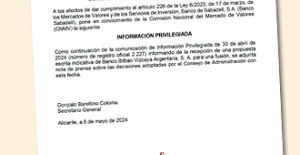 Sabadell rejects the merger with BBVA and will fight to remain alone
Sabadell rejects the merger with BBVA and will fight to remain alone In Germany, the far left wants to cap the price of “doner kebabs”
In Germany, the far left wants to cap the price of “doner kebabs” Israel-Hamas war: Gaza between hope of truce and fear of Israeli offensive in the South
Israel-Hamas war: Gaza between hope of truce and fear of Israeli offensive in the South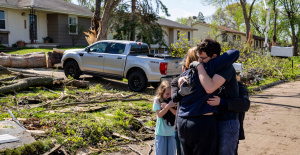 “Mom, Dad, please don’t die”: in the United States, a nine-year-old child saves the lives of his parents injured in a tornado
“Mom, Dad, please don’t die”: in the United States, a nine-year-old child saves the lives of his parents injured in a tornado A baby whose mother smoked during pregnancy will age more quickly
A baby whose mother smoked during pregnancy will age more quickly The euro zone economy grows in April at its best pace in almost a year but inflationary pressure increases
The euro zone economy grows in April at its best pace in almost a year but inflationary pressure increases Children born thanks to PMA do not have more cancers than others
Children born thanks to PMA do not have more cancers than others Breast cancer: less than one in two French women follow screening recommendations
Breast cancer: less than one in two French women follow screening recommendations “House of the Dragon”, “Succession”… Max, the new streaming platform from HBO and Discovery, launched in France on June 11
“House of the Dragon”, “Succession”… Max, the new streaming platform from HBO and Discovery, launched in France on June 11 The A13 motorway will finally reopen this Friday, in one direction only
The A13 motorway will finally reopen this Friday, in one direction only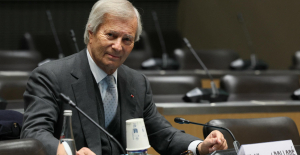 TNT commission of inquiry: tensions between LFI deputies and Macronists before the vote on the report
TNT commission of inquiry: tensions between LFI deputies and Macronists before the vote on the report Apple unveils a new, more efficient iPad range
Apple unveils a new, more efficient iPad range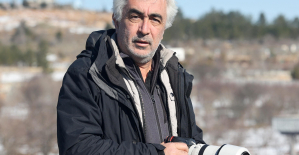 The Gaza War invites itself to the 2024 Pulitzer Prizes
The Gaza War invites itself to the 2024 Pulitzer Prizes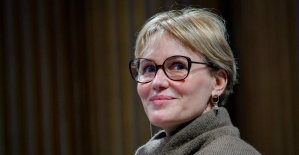 Judith Godrèche presents a short film on sexual violence in Cannes
Judith Godrèche presents a short film on sexual violence in Cannes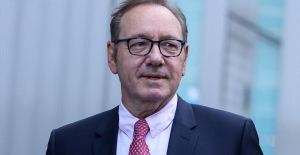 Kevin Spacey: new trial in sight in London for the American actor, for sexual assault
Kevin Spacey: new trial in sight in London for the American actor, for sexual assault Taylor Swift fans make London pub Black Dog their new place of pilgrimage
Taylor Swift fans make London pub Black Dog their new place of pilgrimage Omoda 7, another Chinese car that could be manufactured in Spain
Omoda 7, another Chinese car that could be manufactured in Spain BYD chooses CA Auto Bank as financial partner in Spain
BYD chooses CA Auto Bank as financial partner in Spain Tesla and Baidu sign key agreement to boost development of autonomous driving
Tesla and Baidu sign key agreement to boost development of autonomous driving Skoda Kodiaq 2024: a 'beast' plug-in hybrid SUV
Skoda Kodiaq 2024: a 'beast' plug-in hybrid SUV The home mortgage firm rises 3.8% in February and the average interest moderates to 3.33%
The home mortgage firm rises 3.8% in February and the average interest moderates to 3.33% This is how housing prices have changed in Spain in the last decade
This is how housing prices have changed in Spain in the last decade The home mortgage firm drops 10% in January and interest soars to 3.46%
The home mortgage firm drops 10% in January and interest soars to 3.46% The jewel of the Rocío de Nagüeles urbanization: a dream villa in Marbella
The jewel of the Rocío de Nagüeles urbanization: a dream villa in Marbella Institutions: senators want to restore the accumulation of mandates and put an end to the automatic presence of ex-presidents on the Constitutional Council
Institutions: senators want to restore the accumulation of mandates and put an end to the automatic presence of ex-presidents on the Constitutional Council Europeans: David Lisnard expresses his “essential and vital” support for François-Xavier Bellamy
Europeans: David Lisnard expresses his “essential and vital” support for François-Xavier Bellamy Facing Jordan Bardella, the popularity match turns to Gabriel Attal’s advantage
Facing Jordan Bardella, the popularity match turns to Gabriel Attal’s advantage Europeans: a senior official on the National Rally list
Europeans: a senior official on the National Rally list These French cities that will boycott the World Cup in Qatar
These French cities that will boycott the World Cup in Qatar PSG-Dortmund: a gigantic tifo on three stands to welcome the players
PSG-Dortmund: a gigantic tifo on three stands to welcome the players PSG-Dortmund: in video, Donnarumma’s decisive save which saves the Parisians
PSG-Dortmund: in video, Donnarumma’s decisive save which saves the Parisians Pro D2: Biarritz goes before the regulatory authority and reveals partners
Pro D2: Biarritz goes before the regulatory authority and reveals partners Champions League: without madness then cursed, PSG lets its dreams of the final fly away
Champions League: without madness then cursed, PSG lets its dreams of the final fly away


















